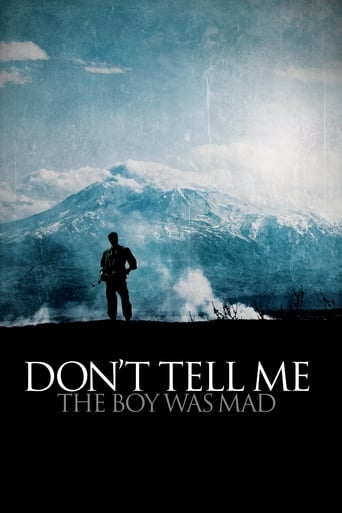cburgess-95885
In 1915, on the eve of the First World War there were two million Armenians living in the Ottoman Empire. On April 24, 1915, the Turkish government began deporting one million Armenians, and slaughtered hundreds of thousands of others outright, in what is now considered to be a deliberate act of ethnic cleansing.
Six years later, on April 24, 1921, Soghomon Tehlirian, a member of the Armenian Liberation Army, assassinates Talaat Pasha, in Berlin, the man thought to have orchestrated the wholesale massacre of Armenians.
At his subsequent trial, Soghomon Tehlirian rejects the charge of murder, claiming that killing Talaat Pasha was justified retribution for Turkish atrocities committed against Armenians, including every ember of his family. A jury of solid German burghers, agreed, and he is acquitted of all charges.
From 1920s Berlin, the film moves to 1970s France, in particular the port city of Marseille. An Armenian family consisting of the husband, the wife, their son and the wife's aged mother, live under the one roof. Much to the annoyance of the parents, the grandmother spends her day singing to her grandchildren about the Turks who are a race of brutes.
One day, the son, Aram, disappears and joins a group of Armenian patriots intent on wreaking havoc on Turks by killing as many as possible. The carefully laid plan backfires: the target, the Turkish ambassador is killed along with an innocent civilian who suffers horrendous injuries.
Adam goes on the run to Lebanon, eventually joining the Armenian Liberation Army.
"Don't Tell Me The Boy Was Mad" is not your usual film about revenge by one group, Armenians, and the enemy, Turks in general. In fact it explores the problem that, in pursuing revenge, innocent women and children will be caught in the crossfire: 'collateral damage' as it's charmingly called; in other words, the oft-quoted euphemism excuse for not allowing sentiment get in the way of the "Cause", that the ends always justifies the means.
Meanwhile, Aram's mother is desperate to apologise to the victim of her son's bomb attack. When she finally asks him what she can do to help, he screams at her: "I'm in my twenties! Can you give me back my legs?"
Gradually, Aram becomes more and more disillusioned with his comrades.
In the end, he leaves.
Director Robert Guediguian's film "Don't Tell Me The Boy Was Mad" shines a much-needed light on this terrible tragedy that, to this day, the Turkish government refuses to admit ever happened.
Kirpianuscus
one of films about the Armenian genocide. as root for feelings and for fight and for discover the other as part of yourself. a film about terrorism. at the first sigh. or about a holy legacy. significant in the case of this film is the equilibrium. and the admirable performances - Ariane Ascaride is the best example. because, in inspired manner, it is not a portrait of events. but the image of soul states in different situations. about the noble ideas and ways to impose an ideal. about crime and about family. and about an accident who change everything. one of films for remember. or discover. not only a national tragedy. but the delicate, precise way to present it at the level of personal every day life.
dbdumonteil
The movie comprises a long prologue and a short epilogue .Shot in black and white close to documentary ,the prologue(Berlin ,1921) depicts the assassination of Talaat Pacha ,main responsible for the Armenian genocide ;during the flashbacks ,we are told about the horrors the convict endured ,how his whole family and a whole people were butchered like lambs in a slaughter.Against all odds,he is acquitted and the audience gives him a standing ovation.The main subject takes place in Marseille and in Beyrouth,sixty years later; a young generation rises and wants to stigmatize the genocide which the Turks have never acknowledged.A young man,Aram,joins the ASALA (Armenian liberation army) ;he blows up the Turkish ambassador's car in Paris but a young cyclist,Gilles ,is seriously injured and becomes crippled .Eaten up with remorse ,he leaves for Lebanon where he joins the forces fighting there .Then the screenplay alternates scenes in Lebanon where the terrorist does not know where he stands anymore and his victim 's horrible fate: " I'm in my twenties ,can he give me back my legs" Gilles's character was inspired by an injured Spanish journalist who reportedly forgave the man who made him a crippled man for life. Aram's mom is eaten with remorse too,she goes to the hospital ,and she leaves him a note which reads :" ask us whatever you need" ;some French critics found it incredible and melodramatic .But Ariane Ascaride is an actress to be reckoned with:I once wrote ,about Guédigian's earlier "Les Neiges Du Kilimandjaro" ,that no living French actress could express compassion as she does ;both movies deal with forgiveness in a shaggy-dog story (that's what the title means)and miss Ascaride ,the director's partner in life ,has a face which can lighten the darkest night.Leprince-Ringuet is equally efficient as the victim who,like many French at the time ,had never heard of the Armenian genocide.A short epilogue:ten years later, two persons who experimented both tragedy bring back Arem where he belongs .It's not the first time Robert Guédigian has used intertwined plots: "La Ville est Tranquille "(2000) ,for instance ,could be subtitled "Sous Le Ciel De Paris" sorry Marseille".A thousand miles away from the trends ,the crazes and the feel-good atmosphere which mar much of the French scene, along Philippe Lioret,he stands alone.


